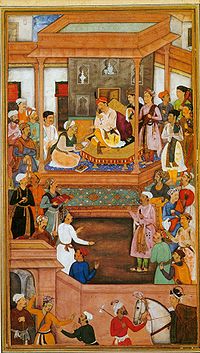- Din-i-Ilahi
-
The Dīn-i Ilāhī (Persian: دین الهی "Divine Faith")[1][2] was a syncretic religious doctrine propounded by the Mughal emperor Jalālu d-Dīn Muḥammad Akbar ("Akbar the Great"), who ruled the Indian subcontinent from 1556 to 1605, intending to merge the best elements of the religions of his empire, and thereby reconcile the differences that divided his subjects.[2] The elements were primarily drawn from Islam and Hinduism, but some others were also taken from Christianity, Jainism and Zoroastrianism.
Akbar promoted tolerance of other faiths. In fact, not only did he tolerate them, he encouraged debate on philosophical and religious issues. This led to the creation of the Ibādat Khāna ("House of Worship") at Fatehpur Sikri in 1575. He had already repealed the Jizya, or tax on non-Muslims, in 1568. A religious experience while hunting in 1578, further increased his interest in the religious traditions of his empire.[3]
From the discussions he led at the Ibādat Khāna, Akbar concluded that no single religion could claim the monopoly of truth. This inspired him to create the Dīn-i Ilāhī in 1581. Various pious Muslims, among them the Qadi of Bengal and the seminal Sufi personality Shaykh Ahmad Sirhindi, responded by declaring this to be blasphemy to Islam.
Dīn-i Ilāhī appears to have survived Akbar according to the Dabestān-e Mazāheb of Mubad Shah (Mohsin Fani). However, the movement never numbered more than 19 adherents.[4]
Din-i-Ilahi was more of an ethical system. It prohibits lust, sensuality, slander and pride, considering them sins. Piety, prudence, abstinence and kindness are the core virtues. The soul is encouraged to purify itself through yearning of God.[2] Celibacy is respected and the slaughter of animals is forbidden. There are neither sacred scriptures nor a priestly hierarchy in this religion.[5]
Disciples of Din-i-ilahi
The initiated disciples of Din-i-ilahi during emperor Akbar the Great's time included (p. 186)[2]:
- Birbal
- Prince Salim
- Abu'l-Fazl ibn Mubarak
- Qasim Khan
- Azam Khan
- Shaikh Mubarak
- Abdus Samad
- Mulla Shah Muhammad Shahadad
- Sufi Ahmad
- Mir Sharif Amal
- Sultan Khwaja
- Mirza Sadr-ud-Din
- Taki Shustar
- Shaikhzada Gosala Benarasi
- Sadar Jahan
- Sadar Jahan's first son
- Sadar Jahan's second son
- Shaikh Faizi
- Jafar Beg
See also
References
- ^ Din-i Ilahi - Britannica Online Encyclopedia
- ^ a b c d Roy Choudhury, Makhan Lal (1941), The Din-i-Ilahi, or, The religion of Akbar (3rd ed.), New Delhi: Oriental Reprint (published 1985, 1997), ISBN 8121507774 (Reprint: 1997)
- ^ Schimmel,Annemarie (2006) The Empire of the Great Mughals: History, Art and Culture, Reaktion Books, ISBN:1861892519
- ^ Din-i Ilahi - Britannica Online Encyclopedia
- ^ Children's Knowledge Bank, Dr. Sunita Gupta, 2004
Categories:- History of medieval India
- History of Pakistan
- Mughal Empire
- Religious faiths, traditions, and movements
- Religious pluralism
Wikimedia Foundation. 2010.

